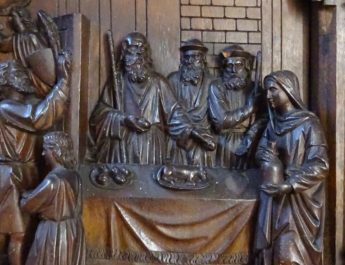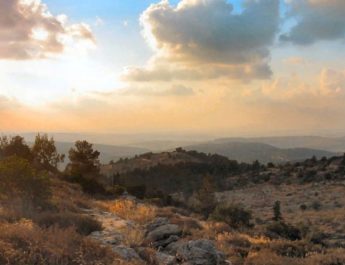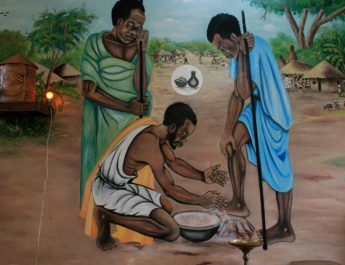Micah 1:3-5 & 5:2-5a & 6:6-8
Narrative Lectionary 110
1:3 ForI the LordII is comingIII out of his placeIV
I {untranslated} = hinneh. From hen (lo! Behold! If, though; an expression of surprise). This is to draw attention, show suddenness or surprise, or to emphasize the importance of the coming statement. See! Lo! Behold!
II “Lord” = YHVH. From havah (to be, become) or hayah (to come to pass, become, be). This is the name of the God of Israel, the self-existent and eternal one, the tetragrammaton. This pronunciation has been lost to time so “Lord” is generally used in its place.
III “coming” = yatsa. This is to go or come out, bring forth, appear. It is to go out in a literal or figurative sense.
IV “place” = maqom. From qum (to arise, stand, accomplish, establish, abide; rising against, getting up after being sick or asleep, arising from one state to another, becoming powerful, or rising for action; standing in a figurative sense). This is a standing, which is to say a spot or space a place. It can also refer to a locality or a physical/mental condition. HaMaqom is also a Jewish name for God – the place, i.e. the Omnipresent One.
and will come downV and treadVI upon the high placesVII of the earth.VIII
V “come down” = yarad. This is to go down, descend; going down in a literal or figurative sense. It can be going to the shore or a boundary, bringing down an enemy.
VI “tread” = darak. This is to tread, march, to walk. Can also mean affixing a string to a box since one needs to step on it to bend it in the process. So, also an archer.
VII “high places” = bamah. The root might mean being high. This is height, wave, or elevation.
VIII “earth” = erets. Root may mean to be firm. This is earth, ground, field land, or country.
4 Then the mountainsIX will meltX under him,
and the valleysXI will burst openXII
IX “mountains” = har. From harar (hill or mountain). This is mountain, hill, hilly region.
X “melt” = masas. This is to melt, discourage, faint. It can be to deteriorate from a sickness or weaken because of sleepiness or an emotional response.
XI “valleys” = emeq. From amoq (to be deep in a literal or figurative sense; profound). This is Vale or valley – frequently part of place names.
XII “burst open” = baqa. This is to break open, breach, divide, rip, shake, tear. It can also mean dash into pieces or being ready to burst.
like wax nearXIII the fire,XIV
like watersXV poured downXVI a slope.XVII
XIII “near” = paneh. From panah (to turn, face, appear). This is face in a literal or figurative sense. It could be face, presence, anger, respect. It can also be used of God to indicate divine favor or presence.
XIV “fire” = esh. This is fire, burning, flaming, hot. It is fire in a literal or figurative sense.
XV “waters” = mayim. This is water, waters, or waterway in a general sense. Figuratively, it can also mean juice, urine, or semen.
XVI “poured down” = nagar. 10x in OT. This is to pour, flow away, spill, run, deliver over, or stretch.
XVII “slope” = morad. Related to “come down” in v1:3. 5x in OT. From yarad (see note V above). This is a slope or descent. It can also refer to an architectural feature – maybe a festoon.
5 AllXVIII this is for the transgressionXIX of JacobXX
XVIII “all” = kol. From kalal (to complete). This is all or every.
XIX “transgression” = pesha. From pasha (to rebel, offend, quarrel; making a break from proper authority so can also refer to an apostate). This is transgression, rebellion, or sin. It could be a revolt on a national scale or an individual moral one.
XX “Jacob” = Yaaqob. From the same as aqeb (heel, hind part, hoof, rear guard of an army, one who lies in wait, usurper). This is Isaac’s son and his descendants. The name means heel-catcher or supplanter.
and for the sinsXXI of the houseXXII of Israel.XXIII
XXI “sins” = chatta’ah. From chata’ (to miss or go wrong and so to sin, bear the blame; it can also include the sense of forfeiting or lacking). This is sin itself as well as punishment for sin. It is sometimes used specifically to refer to sin that is habitual.
XXII “house” = bayit. Probably from banah (to build, make, set up, obtain children; to build literally or figuratively). This is house, court, family, palace, temple.
XXIII “Israel” = Yisrael. From sarah (to persist, exert oneself, contend, persevere, wrestle, prevail) + el (God or god). This is Israel, meaning God strives or one who strives with God; new name for Jacob and for his offspring. This refers to the people and to the land.
What is the transgression of Jacob?
Is it not Samaria?XXIV
And what is the high place of Judah?XXV
Is it not Jerusalem?XXVI
XXIV “Samaria” = Shomron. From shamar (to keep, watch, or preserve; to guard something or to protect it as a thorny hedge protects something). This is Samaria, meaning watch station.
XXV “Judah” = Yehudah. Probably from yadah (to throw one’s hands into the air in a gesture of praise); from yad (hand). This is Judah, meaning “praised.”
XXVI “Jerusalem” = Yerushalaim. From yarah (to throw, shoot, be stunned; to flow as water so figuratively to instruct or teach) + shalam (to make amends, to be complete or sound). This is Jerusalem, dwelling of peace.
5:2 But you, O BethlehemXXVII of Ephrathah,XXVIII
who areXXIX one of the littleXXX clansXXXI of Judah,
XXVII “Bethlehem” = Beth lechem. Related to “house” in v1:5. From bayit (see note XXII above) + lechem (bread, food, loaf; food for people or for animals); {from lacham (to eat, feed on; figuratively, to battle as a kind of consumption/destruction)}. This is Bethlehem, meaning “house of bread.”
XXVIII “Ephrathah” = Ephrathah. 10x in OT. From the same as apher (covering, ashes, bandage); from the same as epher (ashes or dust – properly something strewn) OR from parah (to bear fruit, grow, be fruitful, increase; bearing fruit in a literal or figurative sense) OR from parar (to divide, split) OR from apar (to be exhausted). This is Ephrath or Ephrathah. It is a female name and the name of several places, including Bethlehem. It may mean “fruitfulness,” “exhausted,” “worthless,” or “fruitful.” See https://www.abarim-publications.com/Meaning/Ephrath.html
XXIX “are” = hayah. Related to “Lord” in v1:3. See note II above.
XXX “little” = tsair. From tsaar (to be brought low, small, little one; figuratively, be insignificant or ignoble). This is little, young, least, younger, few in number, low in value.
XXXI “clans” = eleph. Perhaps from the same as eleph (herd, cattle); from alaph (to learn, speak, associate with). This is thousand.
from you shall come forthXXXII for me
one who is to ruleXXXIII in Israel,
whose originXXXIV is from of old,XXXV
from ancientXXXVI days.XXXVII
XXXII “come forth” = yatsa. Same as “coming” in v1:3. See note III above.
XXXIII “rule” = mashal. This is to rule, reign, govern, have authority, wield.
XXXIV “origin” = motsaah. Related to “coming” in v1:3. 2x in OT. From motsa (going forth as an act or the site from which something goes forth; exiting a place or the place where one exits; a source or a produce; a spring or fountain; the dawn as the rising of the sin, an export, gate mine, and so on); from yatsa (see note III above). This is going forth, sewer, latrine.
XXXV “old” = qedem. Perhaps from qadam (to come in front or be in front; to meet, anticipate, confront, receive, or rise; sometimes to meet for help). This is front, formerly, before, east, eternal, everlasting, antiquity.
XXXVI “ancient” = olam. This is a long scope of time whether in the past (antiquity, ancient time) or in the future (eternal, everlasting).
XXXVII “days” = yom. Root may mean being hot. This is the day in a literal or figurative sense. It can also mean birth, age, daylight, continually or other references to time.
3 ThereforeXXXVIII he shall give them upXXXIX until the timeXL
when she who is in laborXLI has brought forth;XLII
XXXVIII “therefore” = ken. Perhaps from kun (properly, in a perpendicular position; literally, to establish, fix, fasten, prepare; figuratively, it is certainty, to be firm, faithfulness, render sure or prosperous). This is to set upright. Generally used figuratively to mean thus, so, afterwards, rightly so.
XXXIX “give…up” = natan. This is to give, put, set, offer. It is to give literally or figuratively.
XL “time” = et. Probably from anah (to answer, sing, announce); from ad (forever, all, old); from adah (to pass on, advance, decorate oneself). This is a period or season. It can also mean whenever or continually.
XLI “is in labor” = yalad. This is to bear or bring forth. It can mean to act as midwife or to show one’s lineage. This is often used for birth or begetting.
XLII “brought forth” = yalad. Same as “is in labor” in v5:3. See note XLI above.
then the restXLIII of his kindredXLIV shall returnXLV
to the peopleXLVI of Israel.
XLIII “rest” = yether. From yathar (to jut over, remain behind, preserve, to excel). This is a remainder or excess. It can imply abundant or superiority. Additionally, it can be cord a free-hanging rope.
XLIV “kindred” = ach. This is brother, kindred, another, other, like. It is literally brother, but it can also be someone who is similar, resembling, or related to.
XLV “return” = shub. To turn back, return, turn away – literally or figuratively. Doesn’t necessarily imply going back to where you started from. This is also the root verb for the Hebrew word for repentance “teshubah.”
XLVI “people” = ben. Related to “house” in v1:5 & “Bethlehem” in v5:2. From banah (see note XXII above). This is son, age, child. It is son in a literal or figurative sense.
4 And he shall standXLVII and feedXLVIII his flock in the strengthXLIX of the Lord,L
XLVII “stand” = amad. This is to stand up in a literal or figurative sense. So it can be establish, continue, endure, take a stand, act, be a servant, stand still, remain, stand against an enemy.
XLVIII “feed” = ra’ah. This is to tend a flock, pasture, or graze. It can mean to rule or to associate with someone. Figuratively, it can be ruler or teacher.
XLIX “strength” = oz. From azaz (to be strong, become fixed, be bold, prevail, be impudent; it means to be stout literally or figuratively. A Late Hebrew word). This is strength in the sense of force, majesty, praise, material and physical strength, the abstract notion of security. It can also speak of social or political power.
L “Lord” = YHVH. Related to “Lord” in v1:3 & “are” in v5:2. It has the same means as “Lord” in v1:3, but with a different vowel pointing. See note II above.
in the majestyLI of the nameLII of the LordLIII his God.LIV
LI “majesty” = ga’own. From the same as ga’avah (majesty, excellency, pride, arrogance, ornament); from gaah (to rise up, be exalted, triumph; figuratively, be majestic). This is majesty, pride, redemption, pomp, excellency, swelling, or arrogance.
LII “name” = shem. May be from sum (to put, place, set). This is name, fame, renown. A name was thought to indicate something essential about a person – something about their individuality. So, this word can also mean honor, authority, or character.
LIII “Lord” = YHVH. Same as “Lord” in v5:4. See note L above.
LIV “God” = Elohim. Related to “Israel” in v1:5. See note XXIII above.
And they shall live secure,LV for now he shall be greatLVI
to the endsLVII of the earth,
5 and he shall be the one of peace.LVIII
LV “live secure” = yashab. This is to sit and so to remain and so to dwell. It is sitting for any reason – as a judge, in order to ambush, or just sitting quietly. Causatively, this can mean settling or marrying. This can also mean continue, endure, or establish.
LVI “be great” = gadal. This is to grow up, become great, become wealthy – to advance. The root meaning may be to twist in the sense of the process of growing.
LVII “ends” = ephes. From aphes (to finish, fail, stop, come to nothing, disappear). This is an end, ceasing, no further. It is often used to refer to the ends of the earth.
LVIII “peace” = shalom. Related to “Jerusalem” in v1:5. From shalam (see note XXVI above). This is completeness, soundness, welfare, favor, friend, good health. It is to be safe and figuratively well, happy, at peace, friendly. Abstractly, it includes the ideas of welfare and prosperity (not in excessive wealth, but in having enough).
If the AssyriansLIX comeLX into our landLXI
and tread upon our soil,LXII
LIX “Assyrians” = Ashshur. From Akkadian Ashshur (“City of God Ashshur”) OR related to Hebrew ashar (to go straight, advance, proceed, direct, guide, be level, be honest, be blessed or happy). This is Assyria, referring to the place and its inhabitants. It is also a name – Ashshur, a descendant of Shem. See https://en.wikipedia.org/wiki/Assyria#Nomenclature.
LX “come” = bo. This is to enter, come in, advance, fulfill, bring offerings, enter to worship, attack. It can also have a sexual connotation.
LXI “land” = erets. Same as “earth” in v1:3. See note VIII above.
LXII “soil” = armon. Root might mean to be high in elevation. So, this is any kind of fortified building like a citadel, castle, tower, or palace.
we will raiseLXIII against them sevenLXIV shepherdsLXV
and eightLXVI rulers.LXVII, LXVIII
LXIII “raise” = qum. Related to “place” in v1:3. See note IV above.
LXIV “seven” = sheba. This is seven or by sevenfold. It can also be used to imply a week or an indefinite number. Symbolically, this is the number of fullness, sacredness, perfection.
LXV “shepherds” = ra’ah. Same as “feed” in v5:4. See note XLVIII above.
LXVI “eight” = shemoneh. Perhaps from shamen (to shine, which implies being oily, growing fat); from shaman (to grow fat, shine, be oily). This is eight or eighth. It can refer to abundance as being more than 7, the number of sacred fullness.
LXVII “rulers” = nsiyk. 6x in OT. From nasak (to pour out or melt; used especially for libations or for the process of making cast metal; can also be used figuratively for anointing a king). This is a drink offering idol made of poured metal, or a leader as an anointed one.
LXVIII {untranslated} = adam. Perhaps from adam (to be red, make ruddy); related to adamah (ground, dirt, earth). This is man, humankind, also Adam’s name. It refers to a human individual or humanity.
6:6 “With what shall I come beforeLXIX the LordLXX
and bowLXXI myself before God on high?LXXII
LXIX “come before” = qadam. Related to “old” in v5:2. See note XXXV above.
LXX “Lord” = YHVH. Same as “Lord” in v1:3. See note II above.
LXXI “bow” = kaphaph. 5x in OT. This is to bend, bow, or curve. It is used for bowed down (as in oppressed), a bulrush bowing, and bowing before God
LXXII “high” = marom. From rum (to be high, rise, exalted, become proud, display, offer, present, set apart, extol; to rise in a literal or figurative sense). This can be height, high place, or lofty. It can be either exalted or haughty/proud. It can refer to dignity or to heaven.
Shall I come before him with burnt offerings,LXXIII
with calvesLXXIV a yearLXXV old?LXXVI
LXXIII “burnt offerings” = olah. From alah (to go up, climb, approach, bring; to be high or actively climb; can be literal or figurative). This is a step, stairs, or some kind of ascent. It is also used for whole burnt offerings, being the offering in which the whole things is burned and rises as smoke. Burnt offerings were the least common of the offerings: most were eaten, shared with the priest and the one bringing the offering.
LXXIV “calves” = egel. May be from the same as agol (round, circular – root meaning revolve). This is a male calf as one that frisks about. Often used for one that is almost grown up. This is also the word used for the molten calf in Ex 32.
LXXV “year” = shanah. From shana (to change, alter). This is a year, age, old. It can also mean yearly.
LXXVI “old” = ben. Same as “people” in v5:3. See note XLVI above.
7 Will the LordLXXVII be pleasedLXXVIII with thousandsLXXIX of rams,LXXX
LXXVII “Lord” = YHVH. Same as “Lord” in v1:3. See note II above.
LXXVIII “pleased” = ratsah. This is to be pleased with, delight, take pleasure in, or accept with favor. It can mean to approve or consent regarding something. It can also be used specifically of satisfying debts or being pardoned.
LXXIX “thousands” = eleph. Same as “clans” in v5:2. See note XXXI above.
LXXX “rams” = ayil. From the same as ul (mighty, strength, body, belly; root may mean to twist and that implies strength and power). This is strength so it is used to indicate things that are strong or powerful: political chiefs, rams, posts, trees, oaks.
with ten thousandsLXXXI of riversLXXXII of oil?LXXXIII
LXXXI “ten thousands” = rebabah. 16x in OT. From rabab (being many or much, abounding, increasing, multiplying; cast together and so the sense of increasing, generally in number). This is abundance, a myriad. It can be an indefinite large amount or mean ten thousand or a million.
LXXXII “rivers” = nachar. From nachal (to gain as a possession, divide for inheritance; to occupy for any reason). This is a brook, wadi, flood, river, stream. It can also refer to the valley in which there is a river during the rainy season. This word is also used for a mineshaft.
LXXXIII “oil” = shemen. Related to “eight” in v5:3. From shamen (see note LXVI above). This is fat, oil, grease, olive oil – often with perfume. Used figuratively for fertile, lavish, rich.
Shall I give my firstbornLXXXIV for my transgression,
the fruitLXXXV of my bodyLXXXVI for the sin of my soul?”LXXXVII
LXXXIV “firstborn” = bekor. From bakar (to bear fruit, be firstborn, firstling, that which opens the womb, give the birthright to). This is firstborn or chief.
LXXXV “fruit” = peri. From parah (to bear fruit, grow, be fruitful, increase; bearing fruit in a literal or figurative sense). This is fruit or reward.
LXXXVI “body” = beten. Root may mean to be hollow. This is the belly or womb. It can also refer to a body more broadly.
LXXXVII “soul” = nephesh. Related to naphash (to refresh or be refreshed). This is soul, self, person, emotion. It is a breathing creature. Can also refer to appetites and desires.
8 He has toldLXXXVIII you, O mortal,LXXXIX what is good,XC
and what does the LordXCI requireXCII of you
LXXXVIII “told” = nagad. This is to declare, make conspicuous, stand in front, manifest, predict, explain.
LXXXIX “mortal” = adam. Same as {untranslated} in v5:5. See note LXVIII above.
XC “good” = tob. From tob (to be pleasing, to be good). This is good, beautiful, pleasant, agreeable, bountiful, at ease. This word is used for goodness as a concept, a good thing, a good person. This can refer to prosperity and welfare as well as joy, kindness, sweetness, and graciousness. So, this is ethically good, but also enjoyably good.
XCI “Lord” = YHVH. Same as “Lord” in v1:3. See note II above.
XCII “require” = darash. This is seek, ask, inquire, care for. Generally it means following in pursuit or following as part of a search, which implies seeking or asking. Also used specially to mean worship.
but to doXCIII justiceXCIV and to loveXCV kindnessXCVI
and to walkXCVII humblyXCVIII with your God?
XCIII “do” = asah. This is to make, do, act, appoint, become in many senses.
XCIV “justice” = mishpat. From shaphat (to judge, defend, pronounce judgment, condemn, govern). This is a verdict or formal sentence whether from humans or from God. It includes the act of judging as well as the place that judging takes place, the suit itself, and the penalty. Abstractly, this is justice, which includes the rights of the participants.
XCV “love” = ahabah. From ahab (love or affection); from aheb (to love, beloved, friend; to have affection for sexually or otherwise). This is love as a noun.
XCVI “kindness” = chesed. From chasad (being good, kind, merciful; may mean bowing one’s neck as is done in the presence of an equal for courtesy’s sake; so, if one in a superior position is treating you like an equal, that is what is captured here). This is favor, goodness, kindness, loving kindness, pity, reproach, or a good deed. When done by God to humanity, this is mercy/loving kindness. When done by humanity to God, it is piety.
XCVII “walk” = halak. This is go, come, walk. It is walk literally and figuratively and includes people and animals. It can be used figuratively for one’s moral life – how we walk according to God’s way or against it. It can also refer to the walk of life as in the course one’s life takes, the choices we make, etc.
XCVIII “humbly” = tsana. 2x in OT. This is to be modest or humble.
Image credit: “Picture taken when I visit Afar, dalol depression Ethiopia” by Waltatekie, 2014.




